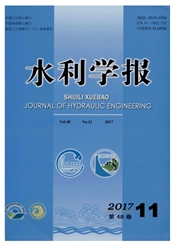

 中文摘要:
中文摘要:
在边坡敏感性分析中,试验方法的选择对试验次数和试验效果起决定作用。均匀设计能使试验点在试验范围内均匀分布,将此试验方法引入到边坡敏感性分析中,可以大大减少试验次数,获得较好的试验效果。以一均质土坡为例,选取容重、内摩擦角、黏聚力、坡角、地震加速度等5个因素来设计数值试验,对边坡进行了敏感性分析。结果表明,在常见的均质土坡或松散堆积体岩土质边坡中,黏聚力、坡角和内摩擦角为最敏感因素;在抗震设防烈度为7度以下的一般岩土体地区,土的重度和地震加速度为不敏感因素。该结论对边坡的综合治理、安全监测和灾害预报具有一定意义。
 英文摘要:
英文摘要:
In sensitivity analysis of slope stability, the number of test times and test effectiveness are dependent on the test approaches. The application of uniform design can effectively reduce the test times and improve the test effectiveness. As a case study, the sensitivity analysis of a homogeneous soil-slope stability is carried out with density of soil, angle of internal friction, cohesion, angle of slope and acceleration of earthquake are selected as the influencing factors for test design. It is found that the cohesion, the angle of slope and the angle of internal friction are sensitive, but the density of soil and acceleration of earthquake are insensitive. The conclusion can be used in the comprehensive remedy, security monitoring and disaster forecasting of slope.
 同期刊论文项目
同期刊论文项目
 同项目期刊论文
同项目期刊论文
 期刊信息
期刊信息
